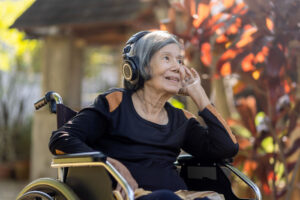Research confirms that people living in care settings are more likely to thrive when they regularly listen to and engage with their favorite music. The music we love can shift our moods, make us happier, even prompt us to sing or dance. So, when your loved one needs to transition to assisted living or a nursing home, access to beloved music will be key to their quality of life throughout the days, months, or years in their new home.
That’s why it’s well worth the effort, when searching for the care home that will be the right fit for your loved one, to be sure to ask about their music program. Is it therapeutic? Is it joyful? Is it the music my mom or dad will love? Some residences make it happen, others not so much.
 Just as people in care homes have a right to meals and meds for their physical health, so, too, do they have a right to be their best selves. Access to their favorite music is one of the best ways to make that happen. Engaging in a conversation with prospective providers about specific music offerings and activities will not only tell you what to expect, but also will give you insight into how much their care culture is built around compassion and empathy.
Just as people in care homes have a right to meals and meds for their physical health, so, too, do they have a right to be their best selves. Access to their favorite music is one of the best ways to make that happen. Engaging in a conversation with prospective providers about specific music offerings and activities will not only tell you what to expect, but also will give you insight into how much their care culture is built around compassion and empathy.
Look for a home that offers as much choice and control to residents as possible. Check to be sure they understand the importance of balancing music and silence, both to meet a range of needs and preferences, as well as to avoid overstimulation.
Key Questions
How to find out? I asked four international experts in the music field, for their advice—Alisa Tagg, Director, National Association of Activities Professionals (US); Bev Foster, Director, Room 217 Foundation (Canada); Grace Meadows, Programme Director, Music for Dementia (UK); and Hayley Antipas, Neurologic Music Therapist, Owner/Director, Attuned Health (Australia).
Based on their answers, here are four target areas to investigate:
Musical Culture
- Tell me about your musical culture, environment, or musical life at your care setting?
- What would my loved one be able to experience on a daily basis?
- How do you personalize music for each individual?
- How does music make a difference to individual quality of life and the wider care community?
- Do you embed music into care plans? In what ways?
Care Culture
- How do you support your staff to ensure that your musical culture isn’t just the responsibility of one or a couple of staff?
- Is music integrated into your care delivery, with all staff buying into your music culture because they believe it is a vital part of care?
- When music is used intentionally as a care resource, research shows there can be improved well-being outcomes for residents, families, and caregivers. Are your care staff trained to intentionally use music to support well-being?
Family Involvement
- How will you involve me in my relative’s musical experiences?
- How do you assess music’s impact on my loved one’s daily quality of life?
- How will I know, when I visit, that music is a core part of their care?
- How is music accessed in their rooms? Dining room? Common rooms?
Certification and Training
- Is your care home certified in any national or regional music delivery programs?
- Do caregivers receive training from music educators or healthcare musicians?
A Few More Items to Consider
One musical program does not fit all. You may wish to select a residence that offers a wide range of music-based services to meet varying and changing needs and preferences, as your loved one ages. A residence that offers both group and individual music-based programs is your best option.
- How often are professional music practitioners engaged with residents?
- Does the care home offer music and movement activities, choirs, drumming groups, access to instruments for those who love to play a guitar or piano?
- How does your care team learn about and support personalized music preferences?
- Is there access to a music therapist who can determine which clinical needs are best met with music?

